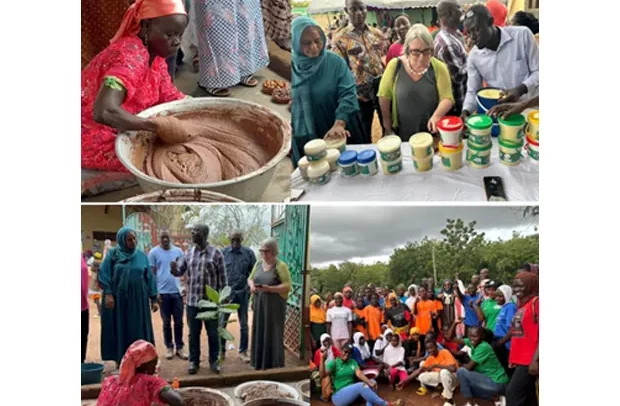Oxfam officials tour some of the beneficiary communities in the North
The Women’s Economic Advancement for Collective Transformation (WEACT) project funded by Global Affairs Canada, under the Innovation for Women’s Economic Empowerment in Ghana (IWEEG) programme with the overall aim of enhancing economic empowerment, well-being, and inclusive growth for women in Ghana, has received great testimonies from beneficiaries from the Northern region.
The project is being implemented in six of the 16 regions in the country, across nine districts in 18 communities and more than 5,400 women (ages 18 to 60) are expected to benefit directly from the project by receiving technical and financial support to empower them economically.
About 1,200 women are expected to participate in dialogue spaces with traditional and religious leaders and while 900 women have already received gender-responsive skills-development training.
Tungteiya Womens Association (TWA) is one of seven partners implementing the WEACT project and has been working in Bungung in the Savelugu Municipality of the Northern region since 2019 and directly reaches 1,456 women, 807 men and another 2,266 others in the community, indirectly.
The initiatives under the WEACT project include Gender Model Family (GMF) aimed at improving capacities for household members to recognise, reduce and redistribute unpaid work thus freeing time for women to actively participate in economic activities.
It also focuses on Legal Literacy Volunteer model, an initiative to prioritise the creation of awareness on existing laws and services to seek redress against negative cultural norms, among others.
The Sexual and Reproductive Health Rights Power to Choose Project by Oxfam at the Garizegu community has also received commendations from community members.
According to them, Garizegu community, before the project, was faced with numerous challenges among young people including high rate of drug abuse, teenage/unwanted pregnancies, and high rate of school dropout.
The women in the entrepreneurship skills programme have indicated that through the project, they can now manage their income, leading to more profit and enabling them to expand their businesses and cater for their families.
Sumani Mudasil, a Power to Choose beneficiary noted that through the project he was able to move away from his friends who engaged in all sorts of vices in the community, adding that he has been able to convince some of them to stop smoking.
Another beneficiary, Abdulai Mufida, said through the Power to Choose project, she has learnt about the dangers of teenage pregnancy, gender-based violence, menstrual hygiene, among others.
Assalama Sidi, Deputy Director, Oxfam in Africa, after touring some selected beneficiary communities in the Northern region, expressed her satisfaction about the impact of the projects in the various communities.
She urged stakeholders, especially opinion leaders and chiefs in the various communities to take the projects as their own and sustain it.
She added that the organisation is committed to expanding to other communities to enable them also benefit from the projects.


